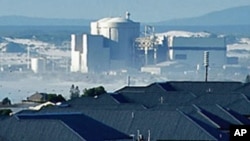Opposition lawmakers are crying foul about a multibillion-dollar nuclear power deal with Russia, saying the agreement could give Moscow the power to veto South African trade with other nuclear providers.
The Sept. 22 strategic partnership, signed on the sidelines of the International Atomic Energy Agency conference in Vienna, comes as Moscow has sought to boost lucrative exports of nuclear equipment, technology and expertise in recent years.
South Africa has tried to do more in recent years to bring electricity to millions; as many as 11 percent of the country’s households—around 3 million people—are estimated to be without power.
Few details of the deal have been released, though the South African government has said Russia could supply as many as eight plants with a capacity of up to 9,600 megawatts of power, with most coming online by 2030.
That would be a welcome infusion of power for South Africa, where a single nuclear power plant is in operation and no new power plants have been built in decades and electrical grid is under heavy pressure.
Eskom, the quasi-governmental energy company, has struggled to bring another coal-fired power station online, but the opening has been repeatedly delayed.
Lance Greyling, a top lawmaker with the opposition party Democratic Alliance, said there was confusion about the Sept. 22 deal. A draft agreement signed last year gave Russia the power to veto South African trade with other nuclear providers, party officials have said.
“What the government is saying at the moment is that they’ve just signed a framework agreement with Russia and that there will still be a procurement process that is followed,” he told VOA on Oct. 3. “But what we are unclear about is what exactly is in this framework agreement, and the fact that they’re not willing to show it to us makes us highly suspicious.”
The government’s deputy director-general for nuclear energy did not answer more than a dozen calls from VOA seeking comment. But in a written statement to the media, the office of President Jacob Zuma denied there was anything untoward in the nuclear energy program. The statement also denied that Russia would have a monopoly on nuclear energy deals with South Africa.
“The agreement with Russia is one of many agreements, similar to the agreement that has been signed by the nation of South Korea, and similar to future agreements with China, France and other interested parties,” said Knox Msebenzi, managing director of the Nuclear Industry Association of South Africa.
If the government has nothing to hide in the deal then it needs to share details of the arrangement with lawmakers, Greyling said.
“We are not ideologically opposed to nuclear energy. We believe that it’s a good technology and that if it is affordable and if it makes sense for the country, certainly we should pursue that,” he said. “But unfortunately, what we have seen in a number of in fact government documents … is that there is huge concern over the impact that it will have on our electricity price, whether it will be affordable.”
The government's new coal-fired plant, the Medupi Power Station, near the border with Botswana, is slated to come on line by the end of this year, adding 4,800 megawatts to the grid. That plant, though, will end up costing more than $10 billion, substantially over budget.
Msebenzi argued that in addition to power generation, the nuclear plants will also bring side benefits, such as technology, manufacturing and jobs. The head of Russia's state-run nuclear company Rosatom, estimated that the new deal could bring in at least $10 billion worth of investment and industry to South Africa.




